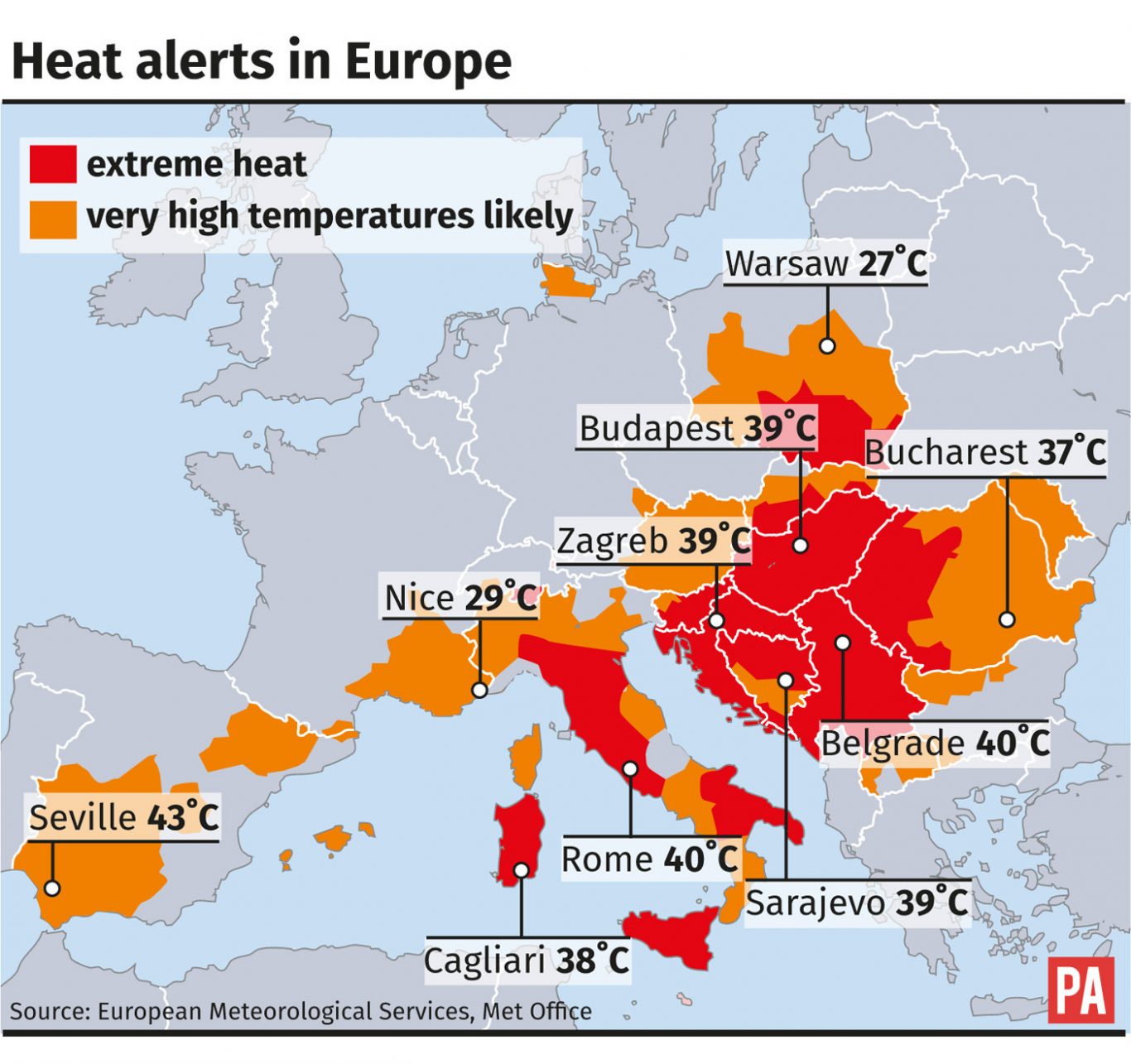
More than 100,000 Europeans could be killed each year by searing heatwaves as well as wildfires, storms and floods by the end of the century, scientists predict.
By 2100, weather-related disasters could affect two thirds of Europe’s population per year, say the experts.
The forecast reflects what is likely to happen if there is no reduction in greenhouse gas emissions and nothing done to improve protection against extreme weather events.
 (PA graphic)
(PA graphic)
Yearly deaths caused by extreme weather could soar 50 times from 3,000 between 1981 and 2010 to 152,000 between 2071 and 2100, according to the forecast published in journal The Lancet Planetary Health.
The study analysed the probable impact of the seven most dangerous types of weather-related event – heatwaves, cold snaps, wildfires, droughts, river and coastal floods, and wind storms in 28 European Union countries together with Switzerland, Norway and Iceland.
Rates of exposure to such disasters were projected to increase from one in 20 of the population at the start of the century to two in three people near its end.
Lead scientist Dr Giovanni Forzieri, from the European Commission’s Joint Research Centre in Italy, said: “Climate change is one of the biggest global threats to human health of the 21st century, and its peril to society will be increasingly connected to weather-driven hazards.
 A woman cools off in a fountain at Piazza del Popolo in Rome (AP)
A woman cools off in a fountain at Piazza del Popolo in Rome (AP)
“Unless global warming is curbed as a matter of urgency and appropriate measures are taken, about 350 million Europeans could be exposed to harmful climate extremes on an annual basis by the end of the century.”
The team analysed 2,300 weather disaster records from 1981 to 2010 to estimate the vulnerability of people living in different countries to each of the seven kinds of event.
This information was then combined with climate change predictions and estimates of how populations might increase and migrate.
Heatwaves were shown to be far and away the most lethal weather effect, responsible for 99% of all future deaths. The number of people dying each year from excessive heat was expected to rise from 2,700 to 151,500.
 A helicopter battles wildfires south of Athens (Thanassis Stavrakis/AP)
A helicopter battles wildfires south of Athens (Thanassis Stavrakis/AP)
The death toll from coastal flooding was also expected to rise substantially, from six deaths per year at the start of the century to 233 by 2100.
Wildfires, river floods, wind storms and droughts had less of an overall effect, but their impact could be concentrated in certain countries, said the researchers.
While global warming might see a reduction in deaths caused by very cold weather, this would not alter the general trend.
Southern Europe was likely to be hardest hit by weather disasters, mainly due to the heatwaves and droughts, according to the study. Here, weather events at the end of the century were projected to cause around 700 deaths per million people.
The #jetstream is sat over the southern half of the UK, separating Europe's hot air from the relatively cooler air we're experiencing pic.twitter.com/BNWlZSQzlN
— Met Office (@metoffice) August 4, 2017
Northern European countries, such as the UK, were in much safer territory with an expected three weather-related deaths per million of the population.
Climate change accounted for 90% of the increased risk from weather disasters, with population growth, migration and urbanisation responsible for 10%, the research showed.
Paul Wilkinson, Professor of Environmental Epidemiology at the London School of Hygiene and Tropical Medicine, said: “While the analysis only considered extreme events, and assumed no reduction in human vulnerability over time from adaptation, it is yet another reminder of the exposures to extreme weather and possible human impacts that might occur if emissions of greenhouse gases continue unabated.
“It adds further weight to the powerful argument for accelerating mitigation actions to protect population health.”


Comments & Moderation
Readers’ comments: You are personally liable for the content of any comments you upload to this website, so please act responsibly. We do not pre-moderate or monitor readers’ comments appearing on our websites, but we do post-moderate in response to complaints we receive or otherwise when a potential problem comes to our attention. You can make a complaint by using the ‘report this post’ link . We may then apply our discretion under the user terms to amend or delete comments.
Post moderation is undertaken full-time 9am-6pm on weekdays, and on a part-time basis outwith those hours.
Read the rules here